北师大版(2019)选择性必修 第一册Unit 1 Relationships语法知识精讲课件(共13张PPT)
文档属性
| 名称 | 北师大版(2019)选择性必修 第一册Unit 1 Relationships语法知识精讲课件(共13张PPT) | 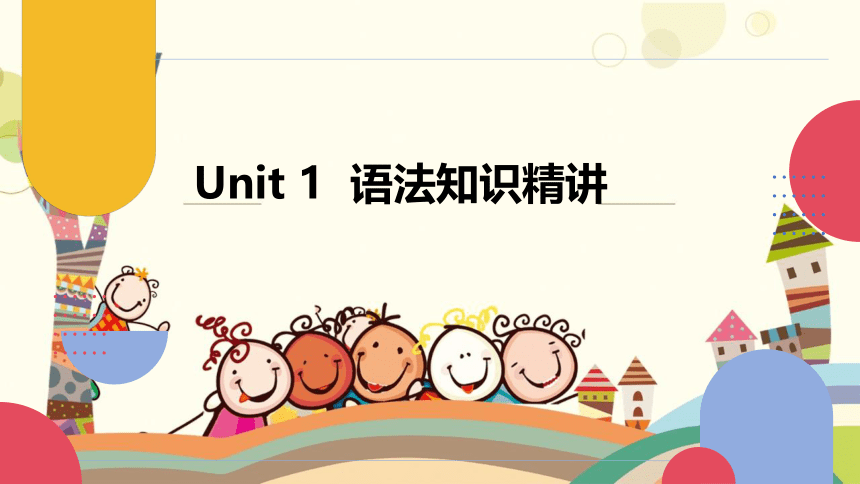 | |
| 格式 | pptx | ||
| 文件大小 | 1.6MB | ||
| 资源类型 | 教案 | ||
| 版本资源 | 北师大版(2019) | ||
| 科目 | 英语 | ||
| 更新时间 | 2024-04-13 19:08:39 | ||
图片预览

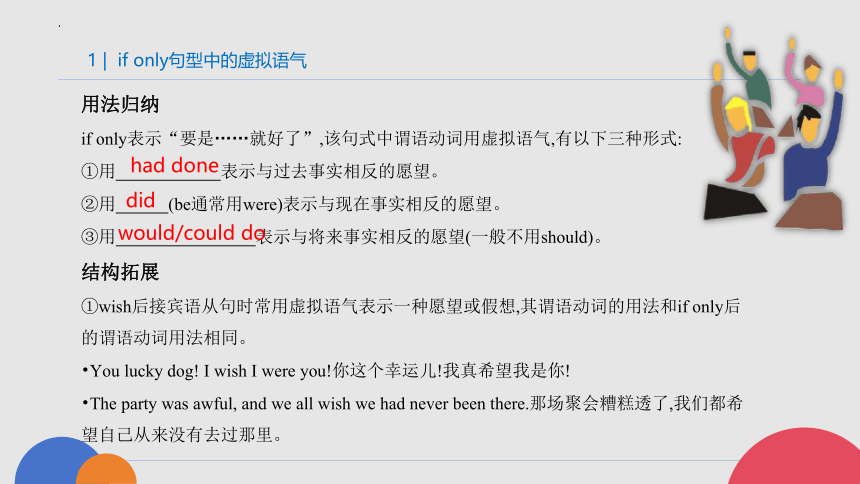
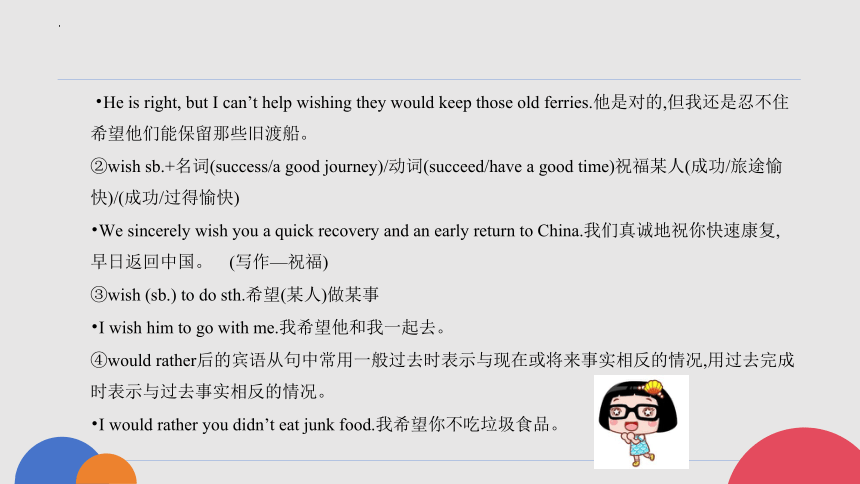
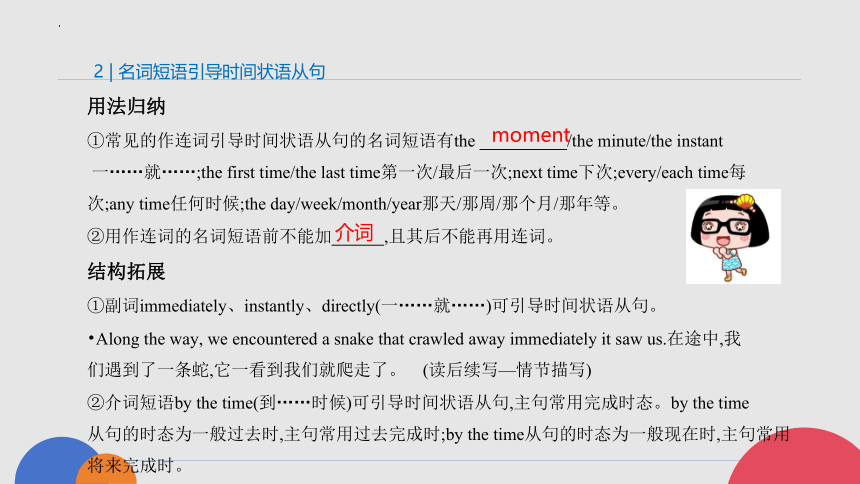
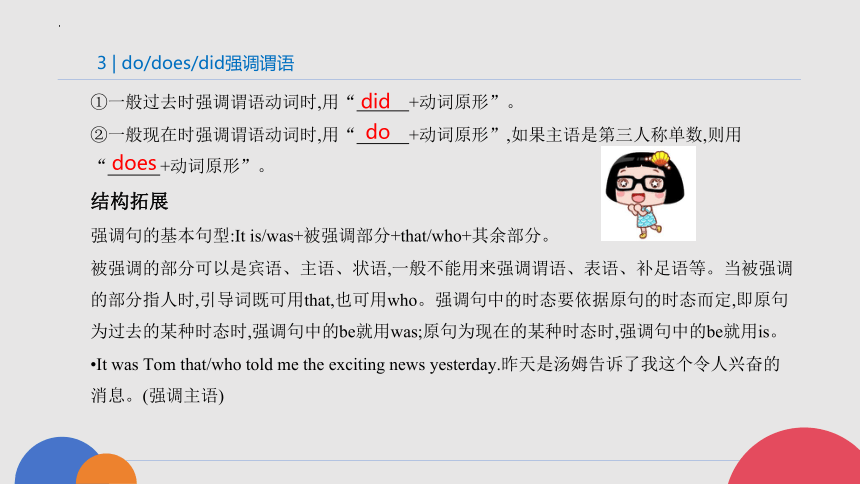
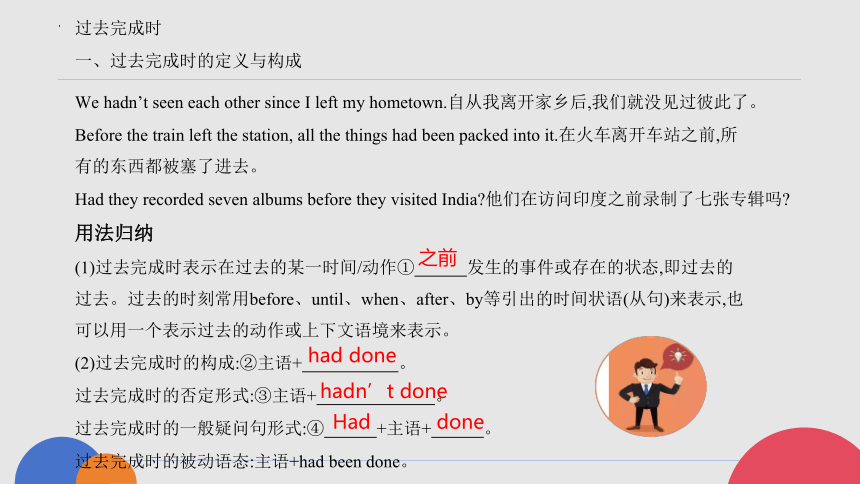
文档简介
(共13张PPT)
Unit 1 语法知识精讲
用法归纳
if only表示“要是……就好了”,该句式中谓语动词用虚拟语气,有以下三种形式:
①用 表示与过去事实相反的愿望。
②用 (be通常用were)表示与现在事实相反的愿望。
③用 表示与将来事实相反的愿望(一般不用should)。
结构拓展
①wish后接宾语从句时常用虚拟语气表示一种愿望或假想,其谓语动词的用法和if only后
的谓语动词用法相同。
You lucky dog! I wish I were you!你这个幸运儿!我真希望我是你!
The party was awful, and we all wish we had never been there.那场聚会糟糕透了,我们都希
望自己从来没有去过那里。
had done
did
would/could do
1 | if only句型中的虚拟语气
He is right, but I can’t help wishing they would keep those old ferries.他是对的,但我还是忍不住希望他们能保留那些旧渡船。
②wish sb.+名词(success/a good journey)/动词(succeed/have a good time)祝福某人(成功/旅途愉快)/(成功/过得愉快)
We sincerely wish you a quick recovery and an early return to China.我们真诚地祝你快速康复,早日返回中国。 (写作—祝福)
③wish (sb.) to do sth.希望(某人)做某事
I wish him to go with me.我希望他和我一起去。
④would rather后的宾语从句中常用一般过去时表示与现在或将来事实相反的情况,用过去完成时表示与过去事实相反的情况。
I would rather you didn’t eat junk food.我希望你不吃垃圾食品。
用法归纳
①常见的作连词引导时间状语从句的名词短语有the /the minute/the instant
一……就……;the first time/the last time第一次/最后一次;next time下次;every/each time每
次;any time任何时候;the day/week/month/year那天/那周/那个月/那年等。
②用作连词的名词短语前不能加 ,且其后不能再用连词。
结构拓展
①副词immediately、instantly、directly(一……就……)可引导时间状语从句。
Along the way, we encountered a snake that crawled away immediately it saw us.在途中,我
们遇到了一条蛇,它一看到我们就爬走了。 (读后续写—情节描写)
②介词短语by the time(到……时候)可引导时间状语从句,主句常用完成时态。by the time
从句的时态为一般过去时,主句常用过去完成时;by the time从句的时态为一般现在时,主句常用将来完成时。
moment
介词
2 | 名词短语引导时间状语从句
①一般过去时强调谓语动词时,用“ +动词原形”。
②一般现在时强调谓语动词时,用“ +动词原形”,如果主语是第三人称单数,则用
“ +动词原形”。
结构拓展
强调句的基本句型:It is/was+被强调部分+that/who+其余部分。
被强调的部分可以是宾语、主语、状语,一般不能用来强调谓语、表语、补足语等。当被强调的部分指人时,引导词既可用that,也可用who。强调句中的时态要依据原句的时态而定,即原句为过去的某种时态时,强调句中的be就用was;原句为现在的某种时态时,强调句中的be就用is。
It was Tom that/who told me the exciting news yesterday.昨天是汤姆告诉了我这个令人兴奋的消息。(强调主语)
did
do
does
3 | do/does/did强调谓语
We hadn’t seen each other since I left my hometown.自从我离开家乡后,我们就没见过彼此了。
Before the train left the station, all the things had been packed into it.在火车离开车站之前,所
有的东西都被塞了进去。
Had they recorded seven albums before they visited India 他们在访问印度之前录制了七张专辑吗
用法归纳
(1)过去完成时表示在过去的某一时间/动作① 发生的事件或存在的状态,即过去的
过去。过去的时刻常用before、until、when、after、by等引出的时间状语(从句)来表示,也
可以用一个表示过去的动作或上下文语境来表示。
(2)过去完成时的构成:②主语+ 。
过去完成时的否定形式:③主语+ 。
过去完成时的一般疑问句形式:④ +主语+ 。
过去完成时的被动语态:主语+had been done。
之前
had done
hadn’t done
done
Had
过去完成时
一、过去完成时的定义与构成
二、过去完成时的用法
情景导学1
We had hoped that you would come, but you didn’t.我们本希望你能来,但是你没有来。
I had thought we might travel as far as Oak Valley, but we only managed the first lap of the
journey.我原以为我们可以旅行到橡树谷那么远,但我们只勉强完成了旅程的第一段。
I had wished festival activities could attract her, but they didn’t work.我本希望节日活动能吸引她,但它们没有奏效。
If you had helped me, I would have got a high score.如果你帮助了我的话,我就会得高分了。
用法归纳1
(1)表示过去未曾实现的⑤ 、打算、意图、诺言等时常用had hoped/planned/meant/
intended/thought/wanted/wished/expected等。
(2)在条件状语从句中,表示与过去事实相反的假设时,从句要用⑥ 。
情景导学2
She had hardly had time to sit and have a rest when the phone rang again.她刚有时间坐下休息
一下,这时电话又一次响起来。
No sooner had I arrived home than the bell rang.我刚到家门铃就响了起来。
It was the third time that he had been out of work that year.这是他那一年第三次失业了。
愿望
过去完成时
用法归纳2
过去完成时的常用句型:
(1)表示“某人第几次做某事”:在It/This/That was the first/second/third/...time that sb. had
done sth.句型中,主句用一般过去时,从句用⑦ 。
(2)表示“一……就……”:在had hardly/scarcely done...when...、had no sooner done...than...
句型中,主句用过去完成时,而when、than引导的从句用一般过去时。
特别提醒
当hardly、scarcely、no sooner位于句首时,主句要用部分倒装。
过去完成时
The bus had already left by the time she arrived.她到达的时候公共汽车已经离开了。
They had arrived home by ten yesterday.他们昨天10点之前到家。
They arrived home at ten yesterday.他们昨天10点到家。
When Tom arrived at the airport, the plane had taken off.汤姆到达机场时,飞机已经起飞了。
三、过去完成时和一般过去时的区别
情景导学
He went to Wuhan last week.上周他去武汉了。
用法归纳
(1)第3句中动作发生在10点之前,所以用过去完成时;第4句中动作发生在10点,所以用一般
过去时。
(2)过去完成时表示动作在过去某个时间或动作之前已经完成,即过去的过去。一般过去时
表示动作在过去的某个时间发生,也表示在过去经常性或习惯性的动作。
(3)使用过去完成时是以⑧ 的某个时间为参照点,而一般过去时是以现在的时间
为参照点。过去完成时和一般过去时在同一个句子或者上下文中体现过去事件发生的顺序。
过去
即时巩固
Ⅰ.单句语法填空
1.The aircraft (plan) to arrive in Beijing on March 8, 2014, but it didn’t.
2.It was the first time that she (chat)online in English.
3.Writing out all the invitations by hand was more time-consuming than we (as-
sume) previously.
4.It took me a long time before I was able to fully appreciate what they (do) for me.
5.I wish I (be) at my sister’s wedding last Tuesday, but I was on a business trip in
New York then.
had planned
had chatted
had assumed
had done
had been
6.A 3-year-old boy who (be) lost in the woods for two days is now safe at home with his family.
7.Mrs. Brown (work) in a high school for three years in the past, but she works in a
bank now.
Ⅱ.完成句子
1.他们比赛获胜的消息很快传遍了整个学校。
The news the game soon spread over the whole school.
2.这是玛丽第五次犯这么简单的错误。
This was the fifth time that Mary such a simple mistake.
3.杰克从英国回到家时,他的儿子已经大学毕业了。
By the time Jack returned home from England, his son .
was
worked
that they had won
had made
had graduated from college
Unit 1 语法知识精讲
用法归纳
if only表示“要是……就好了”,该句式中谓语动词用虚拟语气,有以下三种形式:
①用 表示与过去事实相反的愿望。
②用 (be通常用were)表示与现在事实相反的愿望。
③用 表示与将来事实相反的愿望(一般不用should)。
结构拓展
①wish后接宾语从句时常用虚拟语气表示一种愿望或假想,其谓语动词的用法和if only后
的谓语动词用法相同。
You lucky dog! I wish I were you!你这个幸运儿!我真希望我是你!
The party was awful, and we all wish we had never been there.那场聚会糟糕透了,我们都希
望自己从来没有去过那里。
had done
did
would/could do
1 | if only句型中的虚拟语气
He is right, but I can’t help wishing they would keep those old ferries.他是对的,但我还是忍不住希望他们能保留那些旧渡船。
②wish sb.+名词(success/a good journey)/动词(succeed/have a good time)祝福某人(成功/旅途愉快)/(成功/过得愉快)
We sincerely wish you a quick recovery and an early return to China.我们真诚地祝你快速康复,早日返回中国。 (写作—祝福)
③wish (sb.) to do sth.希望(某人)做某事
I wish him to go with me.我希望他和我一起去。
④would rather后的宾语从句中常用一般过去时表示与现在或将来事实相反的情况,用过去完成时表示与过去事实相反的情况。
I would rather you didn’t eat junk food.我希望你不吃垃圾食品。
用法归纳
①常见的作连词引导时间状语从句的名词短语有the /the minute/the instant
一……就……;the first time/the last time第一次/最后一次;next time下次;every/each time每
次;any time任何时候;the day/week/month/year那天/那周/那个月/那年等。
②用作连词的名词短语前不能加 ,且其后不能再用连词。
结构拓展
①副词immediately、instantly、directly(一……就……)可引导时间状语从句。
Along the way, we encountered a snake that crawled away immediately it saw us.在途中,我
们遇到了一条蛇,它一看到我们就爬走了。 (读后续写—情节描写)
②介词短语by the time(到……时候)可引导时间状语从句,主句常用完成时态。by the time
从句的时态为一般过去时,主句常用过去完成时;by the time从句的时态为一般现在时,主句常用将来完成时。
moment
介词
2 | 名词短语引导时间状语从句
①一般过去时强调谓语动词时,用“ +动词原形”。
②一般现在时强调谓语动词时,用“ +动词原形”,如果主语是第三人称单数,则用
“ +动词原形”。
结构拓展
强调句的基本句型:It is/was+被强调部分+that/who+其余部分。
被强调的部分可以是宾语、主语、状语,一般不能用来强调谓语、表语、补足语等。当被强调的部分指人时,引导词既可用that,也可用who。强调句中的时态要依据原句的时态而定,即原句为过去的某种时态时,强调句中的be就用was;原句为现在的某种时态时,强调句中的be就用is。
It was Tom that/who told me the exciting news yesterday.昨天是汤姆告诉了我这个令人兴奋的消息。(强调主语)
did
do
does
3 | do/does/did强调谓语
We hadn’t seen each other since I left my hometown.自从我离开家乡后,我们就没见过彼此了。
Before the train left the station, all the things had been packed into it.在火车离开车站之前,所
有的东西都被塞了进去。
Had they recorded seven albums before they visited India 他们在访问印度之前录制了七张专辑吗
用法归纳
(1)过去完成时表示在过去的某一时间/动作① 发生的事件或存在的状态,即过去的
过去。过去的时刻常用before、until、when、after、by等引出的时间状语(从句)来表示,也
可以用一个表示过去的动作或上下文语境来表示。
(2)过去完成时的构成:②主语+ 。
过去完成时的否定形式:③主语+ 。
过去完成时的一般疑问句形式:④ +主语+ 。
过去完成时的被动语态:主语+had been done。
之前
had done
hadn’t done
done
Had
过去完成时
一、过去完成时的定义与构成
二、过去完成时的用法
情景导学1
We had hoped that you would come, but you didn’t.我们本希望你能来,但是你没有来。
I had thought we might travel as far as Oak Valley, but we only managed the first lap of the
journey.我原以为我们可以旅行到橡树谷那么远,但我们只勉强完成了旅程的第一段。
I had wished festival activities could attract her, but they didn’t work.我本希望节日活动能吸引她,但它们没有奏效。
If you had helped me, I would have got a high score.如果你帮助了我的话,我就会得高分了。
用法归纳1
(1)表示过去未曾实现的⑤ 、打算、意图、诺言等时常用had hoped/planned/meant/
intended/thought/wanted/wished/expected等。
(2)在条件状语从句中,表示与过去事实相反的假设时,从句要用⑥ 。
情景导学2
She had hardly had time to sit and have a rest when the phone rang again.她刚有时间坐下休息
一下,这时电话又一次响起来。
No sooner had I arrived home than the bell rang.我刚到家门铃就响了起来。
It was the third time that he had been out of work that year.这是他那一年第三次失业了。
愿望
过去完成时
用法归纳2
过去完成时的常用句型:
(1)表示“某人第几次做某事”:在It/This/That was the first/second/third/...time that sb. had
done sth.句型中,主句用一般过去时,从句用⑦ 。
(2)表示“一……就……”:在had hardly/scarcely done...when...、had no sooner done...than...
句型中,主句用过去完成时,而when、than引导的从句用一般过去时。
特别提醒
当hardly、scarcely、no sooner位于句首时,主句要用部分倒装。
过去完成时
The bus had already left by the time she arrived.她到达的时候公共汽车已经离开了。
They had arrived home by ten yesterday.他们昨天10点之前到家。
They arrived home at ten yesterday.他们昨天10点到家。
When Tom arrived at the airport, the plane had taken off.汤姆到达机场时,飞机已经起飞了。
三、过去完成时和一般过去时的区别
情景导学
He went to Wuhan last week.上周他去武汉了。
用法归纳
(1)第3句中动作发生在10点之前,所以用过去完成时;第4句中动作发生在10点,所以用一般
过去时。
(2)过去完成时表示动作在过去某个时间或动作之前已经完成,即过去的过去。一般过去时
表示动作在过去的某个时间发生,也表示在过去经常性或习惯性的动作。
(3)使用过去完成时是以⑧ 的某个时间为参照点,而一般过去时是以现在的时间
为参照点。过去完成时和一般过去时在同一个句子或者上下文中体现过去事件发生的顺序。
过去
即时巩固
Ⅰ.单句语法填空
1.The aircraft (plan) to arrive in Beijing on March 8, 2014, but it didn’t.
2.It was the first time that she (chat)online in English.
3.Writing out all the invitations by hand was more time-consuming than we (as-
sume) previously.
4.It took me a long time before I was able to fully appreciate what they (do) for me.
5.I wish I (be) at my sister’s wedding last Tuesday, but I was on a business trip in
New York then.
had planned
had chatted
had assumed
had done
had been
6.A 3-year-old boy who (be) lost in the woods for two days is now safe at home with his family.
7.Mrs. Brown (work) in a high school for three years in the past, but she works in a
bank now.
Ⅱ.完成句子
1.他们比赛获胜的消息很快传遍了整个学校。
The news the game soon spread over the whole school.
2.这是玛丽第五次犯这么简单的错误。
This was the fifth time that Mary such a simple mistake.
3.杰克从英国回到家时,他的儿子已经大学毕业了。
By the time Jack returned home from England, his son .
was
worked
that they had won
had made
had graduated from college
同课章节目录
- Unit 1 Relationshis
- Lesson 1 Teachers
- Lesson 2 How Do We Like Teachers’ Feedback?
- Lesson 3 So Close,Yet So Fa
- Unit 2 Success
- Lesson 1 Money vs Success
- Lesson 2 Top Five Secrets of Success
- Lesson 3 Getting to the Top
- Unit 3 Conservation
- Lesson 1 The Sixth Extinction
- Lesson 2 War on Plastic Packets
- Lesson 3 The Road to Destruction
